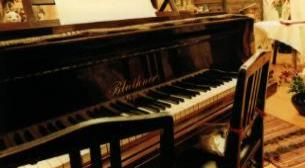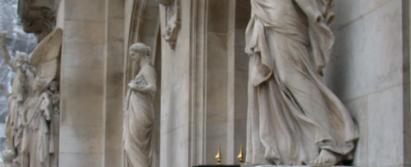
あるアメリカ人記者より一通の手紙が届いた。かつて家族ぐるみでつき合いのあった巨匠レオニード・クロイツアー氏との思い出を語ってほしいと・・・。
音楽を愛し、祖国を離れ日本を愛し、そして天才少女フジ子・へミングを愛した巨匠レオニード・クロイツアー氏との思い出。
多くを語らないフジ子・へミングの思い出あふれる手紙を訳さずそのまま原文掲載いたします。
フジ子・へミングの奏でるリスト:「愛の夢」とともに・・・

Mr. ・・・
U.S.A
Subject : Mr. Leonid Kreuzer
Dear ・・・
First of all I would like to thank
you for your letter.
I shall tell you about Mr. Kreuzer as much as my memory permits.
Around the time when the first World War broke out, my mother
was studying piano under Mr. Kreuzer in Berlin. My father was
a Swedish-Russian and was studying architecture as Bauhaus in
Weimar, and also worked for a moviecompany designing posters.
When the war started Mr. Kreutzer's
Japanese pupils became quite concerned regarding his safety and
recommended his going to Tokyo and assisted him.
Mr. Kreuzer then began teaching piano in Tokyo.
My father was not persecuted by the Nazis and he later came to
Tokyo
with my mother. The number of foreigners in Japan were few at
the time and my father and Mr. Kreuzer became friends as they
both spoke German.
My father was away from home most of the time and finally left.
My mother often took me to Mr.
Kreutzer's recitals when I was a small child.
I still remember the beautiful melody of Listz's "Campanella"
played by him.
Kreuzer family believed that Germany and Japan would both lose
the war and I later realized how accurate his prediction was.
When I was about ten years old, I was taken by my mother to visit
Mr. Kreuzer. As we walked in,I noticed a delicious smell of something
being
cooked which had a hint of parsley in it.
It was very different from Japanese cooking. There was an oil
painting of a white lily on the wall of the dining room done by
my father.
Mr. Kreuzer looked at me, smiled warmly, and offered me tea and
cake.
That was the day of my first piano lesson with him.
At first, Mr. Kreuzer told my mother that he was not stupid as
to teach piano to youngsters and had been refusing to give me
lessons.
I played Bach and Chopin's Waltz.
He was astonished and overjoyed when he heard me play and said
there weren't many who could play as she does.
I shall teach her and you need not pay for the lessons I give
her.
I do not remember this day particularly.
I believe he was a man with a very big heart and there was something
very genuine about him. I knew he was disliked by the Japanese
music circle and there were always rumors going around about his
affairs with married women.
My father finally left us and went away with another woman.
Mr. Kreuzer would play the piano with a big, fat cigar in his
mouth and played Debussy, Beethoven, Chopin, Moscowski, Rafmaninoff,
Schumann, etc.
and had a smile on his face all the while. He must have felt wonderful
when playing. His music had great influence on me at the time,
as it does now.
I played Chopin's "Black Key" that day and when he heard
me play he became so excited he started jumping and down and shouted
"This child will one day charm the world with her powerful
and brilliant music. I remember this very clearly.
When the war ended, Mr. Kreuter was imprisoned and beaten.
A month or two later, he went to live with a Swedish friend in
Chigasaki,
a small seaside town not far from Tokyo, and married one of his
young pupils.
Mr. Kreuzer visited me from time to time and gave me lessons.
For my first recital, he send me music scores with his notes on
it.
He passed away soon after wards.
I hope this letter will be of some assistance to you.
Yours Sincerely,
Fujiko Hemming


掲載写真および手紙はフジ子さんの御好意で載せています。
写真および手紙の複写・転載は御遠慮くださいませ。
ホームページに関するお問い合わせはこちらまで。